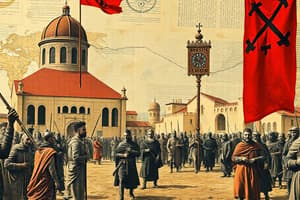Podcast
Questions and Answers
What was the primary motivation behind the First Crusade?
What was the primary motivation behind the First Crusade?
- To convert the Muslim population to Christianity
- To expand the Byzantine Empire's territories
- To retake Jerusalem for Christianity (correct)
- To establish trade routes to the East
What was the outcome of the Second Crusade in 1147?
What was the outcome of the Second Crusade in 1147?
- The capture of Jerusalem
- The establishment of the Crusader States
- A failure due to overconfidence and strategic mistakes (correct)
- A truce with the Muslim rulers
Which group's failure led to the eventual success of the First Crusade?
Which group's failure led to the eventual success of the First Crusade?
- The Byzantine Empire
- The Seljuk Turks
- The Crusader States of Outremer
- The People's Crusade (correct)
Who was responsible for the fall of Jerusalem in 1187?
Who was responsible for the fall of Jerusalem in 1187?
What was the outcome of the Third Crusade, despite the involvement of notable leaders?
What was the outcome of the Third Crusade, despite the involvement of notable leaders?
What was the primary reason for the crusaders sacking the Christian city of Zara during the Fourth Crusade?
What was the primary reason for the crusaders sacking the Christian city of Zara during the Fourth Crusade?
What was the deal made between Alexios IV Angelos and the crusaders during the Fourth Crusade?
What was the deal made between Alexios IV Angelos and the crusaders during the Fourth Crusade?
What was the immediate consequence of the crusaders breaching Constantinople's walls during the Fourth Crusade?
What was the immediate consequence of the crusaders breaching Constantinople's walls during the Fourth Crusade?
Which of the following statements best describes the overall outcome of the Crusades after the Fourth Crusade?
Which of the following statements best describes the overall outcome of the Crusades after the Fourth Crusade?
What was the ultimate impact of the Crusades on the Middle East and the Byzantine Empire?
What was the ultimate impact of the Crusades on the Middle East and the Byzantine Empire?
Flashcards are hidden until you start studying
Study Notes
- The Crusades were a series of wars fought in the Middle Ages to retake Jerusalem for Christianity, with the First Crusade being called in the 11th century in response to political changes in the Middle East.
- The Byzantine Emperor sought help from the Pope to combat the Seljuk Turks, leading to Pope Urban II preaching the crusades outside the cathedral of Clermont in 1095.
- The People's Crusade, which occurred before the organized crusading armies arrived, ended in failure as the disorganized mob was slaughtered by the Seljuk Turks.
- The successful First Crusade resulted in the capture of Jerusalem in 1099, with the Crusaders committing brutal massacres upon their victory.
- The Crusader States of Outremer were established, surrounded by a Muslim majority, leading to alliances being forged with Muslim rulers for survival.
- The Second Crusade in 1147, aimed at protecting the Crusader states, ended in failure due to overconfidence and strategic mistakes, with Nur Ad-Din emerging as a formidable Muslim leader.
- Saladin, succeeding Nur Ad-Din, defeated King Guy of Jerusalem at the Horns of Hattin in 1187, leading to the fall of Jerusalem and the call for the Third Crusade.
- The Third Crusade involved notable leaders like Richard I of England and King Philip II of France, culminating in a truce without recapturing Jerusalem, with Richard leaving in 1192.
- The Fourth Crusade, called in 1198, faced challenges including financial issues, leading to the crusaders sacking the Christian city of Zara and being excommunicated by the Pope.- Alexios IV Angelos sought the help of crusaders to retake the throne of Constantinople in exchange for silver, troops for an expedition to Egypt, and placing the Byzantine Empire under the authority of the Catholic Pope.
- The crusaders, after breaching Constantinople's walls, sacked the city due to payment delays, leading to the fall of Constantinople and parts of Greece into Latin Christian hands, dismantling the once powerful Byzantine Empire.
- The aftermath of the Fourth Crusade led to a decline in enthusiasm for crusading in Europe, with subsequent Crusades like the Fifth, Sixth, Seventh, and Eighth achieving little success and facing defeats.
- The Sixth Crusade led by Frederick II resulted in a peaceful acquisition of Jerusalem, but the city was later reclaimed by Muslims, leading to further unsuccessful crusades like the Seventh and Eighth.
- The Ninth Crusade, led by Lord Edward (future King Edward I of England), was short-lived as he had to return home quickly, marking the gradual dwindling of Western Europe's interest in crusading.
- The crusades ultimately had little impact on the Middle East but led to the destruction of the Byzantine Empire, which the crusaders had initially vowed to protect.
Studying That Suits You
Use AI to generate personalized quizzes and flashcards to suit your learning preferences.






